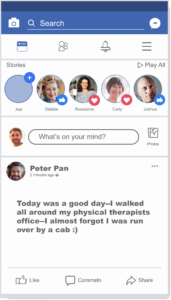Carly, 47, has breast cancer that recently metastasized to her brain.
Debbie’s husband, the love of her life, succumbed to brain cancer after a long struggle.
 Peter has been learning to walk again ever since a cab ran him over and almost killed him.
Peter has been learning to walk again ever since a cab ran him over and almost killed him.
Roseanne lost her teenage son to a rare genetic disorder.
These are real people, although I’ve changed their names, and I know them all. Besides having unfortunate circumstances in their lives, they share something else: They give voice to their grief, fear, anger, loneliness, challenges and triumphs on Facebook.
Carly asks for help getting to the hospital for treatment, graphically details her illness, and complains when she doesn’t think others understand her travails.
Debbie talks about how deeply she misses her husband and shares countless memories.
Peter chronicles his rehabilitation progress and explains what it’s like “living” in a wheelchair.
Roseanne keeps her son alive by raising awareness for the disease that took his life.
These are the OTHER FACES of Facebook, not the countless faces of those who talk incessantly of their joyous, rich, stylish, successful, and perfect lives. These other faces aren’t crying out for joy, but are reaching out for solace, for company, and to vent fear, frustration, or anger.
While the supercilious set successfully attracts legions of adoring fans who gush over their flawless lives, do those beset by crises and tragedy derive the solace they seek?
When Carly talks about her intensely painful headaches or her vomiting episodes following experimental chemo treatments, do the solicitous comments on her Facebook page relieve her?
When Peter recounts how he laboriously walked onto the cruise ship for a vacation, do the cheering comments help urge him on?
 When Debbie tells her followers how lonely she feels lying in bed without her soulmate, do her public pronouncements abate her loneliness?
When Debbie tells her followers how lonely she feels lying in bed without her soulmate, do her public pronouncements abate her loneliness?
It can be exciting or cathartic to share our successes or setbacks with those we love. But, what drives so many of us to not only to overshare, but to overshare with more people than need or want to know about our lives?
Communication back in the day was pretty easy to interpret, such as the intimate correspondence between famous lovers Abelard and Heloise during the 12th century, or between Ronald and Nancy Reagan in the 20th. Facebook communication is another matter, a complicated issue that anthropologists undoubtedly will be studying centuries from now.


0 Responses to “Getting Intimate on Facebook”
İzmit Kurye says:
izmit motorlu kurye, https://www.izmitkurye.net